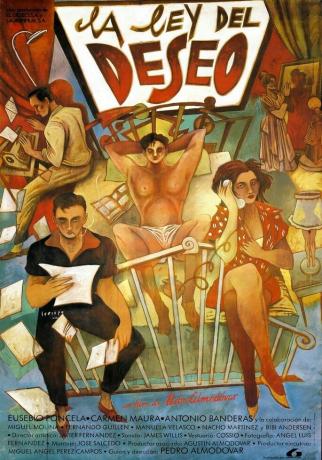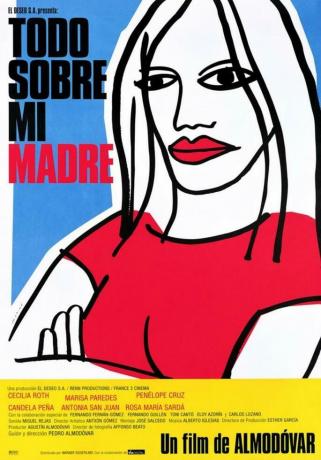10 essential Pedro Almodóvar films
Pedro Almodóvar is the most international Spanish film director after Luis Buñuel. His filmography is born in the bowels of a hurt Spain that still had to get used to modernity.
His cinematographic work, which began as a kind of "game" that invited freedom of expression, is today taken as a valuable legacy, since Almodóvar's cinema is humor and surrealism, but, above all, it is identity and style own self.
These are the ten essential films to understand Pedro Almodóvar's cinema based on his chronology.
1. The law of Desire (1987)

The law of Desire it is a masterpiece of cinema queer. In the film, the director speaks openly about issues such as homosexuality and transsexuality. It is part of his first stage as a director and in it he forges the foundations of a melodramatic cinema.
The story unfolds around the relationship of Pablo, a homosexual film director, and Antonio, an actor. The two meet at a movie premiere after Pablo's partner put an end to their relationship. Then, the director becomes obsessed with Antonio, a possessive man. A young Carmen Maura plays Tina, Pablo's transsexual sister.
With this film, Almodóvar's cinema is technically perfected. Compared to previous films, it stands out for a cleaner shot composition.
The theme and the plot are outlining the line of auteur cinema that characterizes his films so much due to the difficulty of pigeonholeing them into a specific genre.
2. Women at the edge of a nervous attack (1988)

It is one of the director's most famous films, as it marked his first Oscar nomination for Best Foreign Language Film and, with it, the international leap in his career.
It is a comedy that borders on melodrama and that offers, in a twisted way, the depths of human relationships through characters who express their most intimate concerns. The humorous situations are also mixed with the most tragic elements.
One of the highlights of the film is the peculiar character of its characters, all of them show despair in the face of the most crazy situations.
In this film, the female role is essential, which is a song about loneliness and the search for happiness of its protagonists that almost borders on ridiculous comedy.
3. Everything about my mother (1999)

Everything about my mother it also marked the international success of the director by obtaining numerous awards, including the Oscar for best foreign language film. It is a comedy inspired by a classic, in this case, the play by Tennessee Williams, although it was written and directed by Almodóvar himself.
The film deals with a female struggle, specifically the battle of Manuela, a single mother who sees her 17-year-old son die. After the tragedy, he decides to return to Barcelona, the city where he lived in the past, to look for the father of his son.
The film is a family tragedy that talks about loneliness, family and gender diversity, themes very present in Almodóvar's filmography.
It is a film with a very attractive plot that, due to its emotional nature, captures the viewer from the first scene to the last thanks to a slower, melancholic and reflective tone, which differentiates films.
4. Talk to her (2002)

It is one of the most outstanding films of the Almodóvar. It can be considered one of the many masterpieces of the director.
Unlike other films by the filmmaker that feature female characters and their particular relationship with the world around them, male roles play an important role in this film.
Talk to her is a melodrama that focuses his speech on the emotions of the protagonists, two men who take care of their lovers while they are in a coma.
Throughout the film, themes such as death, rape or personal relationships are shown that, under a classic structure, make the viewer empathize with the characters. Thanks to this, the director manages to manipulate and guide the viewer throughout the entire narrative.
5. Bad Education (2004)

This film revolves around the story of Ignacio and Enrique, two men who meet after many years, after having spent their childhood in a priests' college and being victims of sexual abuse by one of the they.
A film starring men that once again inquires about the sexual identity of the characters, a recurring theme in the director's cinema.
Maybe Bad Education It is one of Almodóvar's best films about homosexuality, but one of the reasons that makes it so great is the exposure of his personal history in his plot.
6. Return (2006)

This film once again reveals female protagonism and her complex inner world.
At first, the film seems like yet another melodrama, however, in the middle of the drama, the story turns upside down and offers an almost comical plot as a result.
The plot is a portrait of the life of Raimunda, a woman who struggles in the face of adversity and who shares her life with an unemployed worker and her adolescent daughter.
From Return surprises its argument based on ghost stories. Raimunda's mother, played by Carmen Maura, returns from beyond to speak with her daughters.
After its premiere, it received numerous nominations and, it was to be expected, since the director perfectly combines a melodrama starring women and masterful dialogues together with a magnificent performance by the actresses protagonists.
7. Broken Embraces (2009)

It is one of the longest films of his filmography and, if we had to describe it in a single word, this would be a meta-movie. A story about a filmmaker within the cinematographic medium itself.
That is what the Manchego director offers in Broken Embraces, an independent drama that tells the story of Mateo Blanco, a blind screenwriter and former director who recounts what his life was like before he lost his vision after an accident and what his love story with an actress was like. In his daily life he is cared for by Judit, who was his production assistant in the past, and by his son Diego.
The story is based on the present of Matthew, although the use of flashbacks, shows how he met Lena, the love of her life, when she was working as an actress.
The film begins as a melodrama that gradually relaxes. It is not the script but the staging one of the elements that most characterize this film, shot in striking tones and making masterful use of geometric shapes.
8. The Skin I Live In (2011)

This movie is based on the novel Tarantulaby the writer Therry Jonquet. Unlike the melodrama that the director is used to capturing in his cinematographic works, The Skin I Live In sticks out in the form of thriller psychological.
It is one of the most creative stories of the author if we take as a reference a script full of surprises and unexpected twists.
The narrative complexity involved in an argument, at least an original one, is also revealed. An experienced Antonio Banderas plays Dr. Ledgard, a plastic surgeon who tries to create a new skin, after he her wife died the victim of a traffic accident, which is resistant to any damage and would have allowed him to save her. The obsession to achieve his goal makes him cross the line of legality and become a criminal.
In terms of subject matter, it is one of the most exquisite and committed works of the director's filmography, which can generate in the viewer both curiosity and rejection in equal measure.
9. Juliet (2016)

This film is another literary adaptation that the director takes to the cinema. This time he was inspired by three stories that appear in the book Escape by Canadian writer Alice Munro.
Julieta is Almodóvar's twentieth film and narrates the drama of a woman who tries to accept the disappearance of her daughter. One day, Julieta meets a friend of her daughter, this fact makes her wake up memories about what happened and decides to write a letter to the young woman explaining her story from the day she met her father.
It is a film that investigates the feelings of guilt, secrets and lies in Juliet's life. Spanish actresses Adriana Ugarte and Emma Suárez play Julieta in the past and present, respectively.
This film supposes the loss of the melodrama to which Almodóvar has accustomed his audience and is consecrated as a drama in its purest form. Without a doubt, it is one of the most successful films of his filmography, since it finds a perfect balance point between visual technique and emotional strength, which makes us reflect on the complexity of life through a look towards the past.
10. Pain and glory (2019)

Pain and glory It is the last success of the filmmaker and the premiere of it has been the culmination of his career.
It stars an exceptional Antonio Banderas who plays Salvador, a successful film director who, in the twilight of his career, he remembers his childhood in Paterna, in the 60s, and his later youth in Madrid in the years 80.
Salvador has given everything for the cinema, his life would not be understood without the cinematographic medium. For the viewer it is almost impossible not to empathize with the emotional decline of the protagonist who tries to struggle with his past and that he does not understand his life without cinema, the engine that has driven him to continue towards in front of.
Although there is no certainty that the plot revolves around the life of Almodóvar himself, there is no doubt that his script opens the channel to the viewer. In a sincere and delicate way, he exposes in an incomparable way the most hidden details of the life of a successful director, in which Almodóvar himself could recognize himself.
Biography of Pedro Almodóvar

He was born in 1949 in Calzada de Calatrava, a small town in La Mancha. During his youth, he moved to Madrid, his adopted land, where he began to work as an actor. Theater and photonovel writer, he also recorded his first provocative-themed short films.
In the 80s he was part of the most important countercultural movement of the decade, known as "movida madrileña". It is then that he records his first feature film: Pepi, Lucy, Bom and other girls of the lot (1980). The provocative theme and the construction of extravagant characters already draw in this film the cinematographic style that will characterize the director and that will accompany him throughout his journey.
His career as an international director was consolidated with the premiere of Women at the edge of a nervous attack (1988) and, since then, his cinematographic work has not stopped reaping successes and has received innumerable recognitions in the most important film awards, one of the most important is the Golden Lion of Honor of the 76th edition of the Mostra de Venice.
You can also read Luis Buñuel: main films and stages.
Complete filmography of Pedro Almodóvar
- Pepi, Luci, Bom and other girls from the heap, 1980
- Labyrinth of passions, 1982
- In darkness, 1983
- What have I done to deserve this?, 1984
- Bullfighter, 1986
- The law of Desire, 1986
- Women at the edge of a nervous attack, 1988
- Tie Me Up!, 1989
- Far heels, 1991
- Kika, 1994
- The flower of my secret, 1995
- Tremulous flesh, 1997
- Everything about my mother, 1999
- Talk to her, 2002
- Bad Education, 2004
- Return, 2005
- Broken Embraces, 2009
- The Skin I Live In, 2011
- The passing lovers, 2013
- Juliet 2016
- Pain and glory, 2019



